Maritime Studies Assignment: Economic Impact of Shipping Practices
VerifiedAdded on 2022/09/21
|7
|1226
|58
Homework Assignment
AI Summary
This assignment delves into the complexities of maritime studies, focusing on the impact of containerization and the use of Flags of Convenience (FOC) on the global economy. It analyzes the positive and negative effects of containerization, including increased port efficiency, reduced shipping costs, and its role in global trade, while also addressing concerns about infrastructure investment and job displacement. The assignment further examines FOC, exploring its implications for taxation, security, and labor issues within the maritime industry, and the economic losses associated with these practices. Additionally, the document provides definitions of key economic terms such as economies of scale, equilibrium, monopoly, and oligopoly, and discusses challenges faced by shipping lines due to competition. The assignment concludes with an overview of the long-term effects of competition on the shipping industry, including conflicts, market disruption, and the rise of mergers and acquisitions.
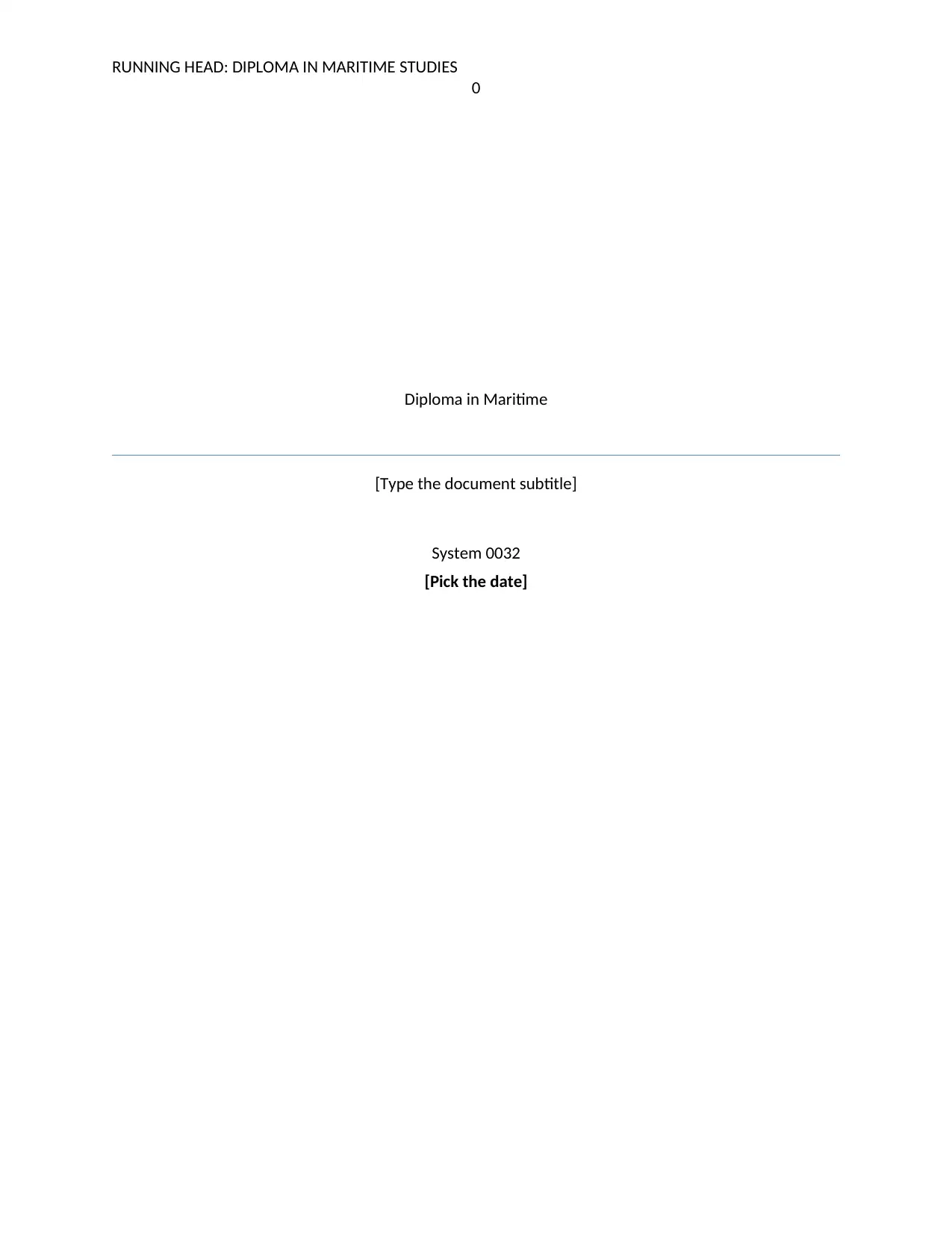
RUNNING HEAD: DIPLOMA IN MARITIME STUDIES
0
Diploma in Maritime
[Type the document subtitle]
System 0032
[Pick the date]
0
Diploma in Maritime
[Type the document subtitle]
System 0032
[Pick the date]
Paraphrase This Document
Need a fresh take? Get an instant paraphrase of this document with our AI Paraphraser
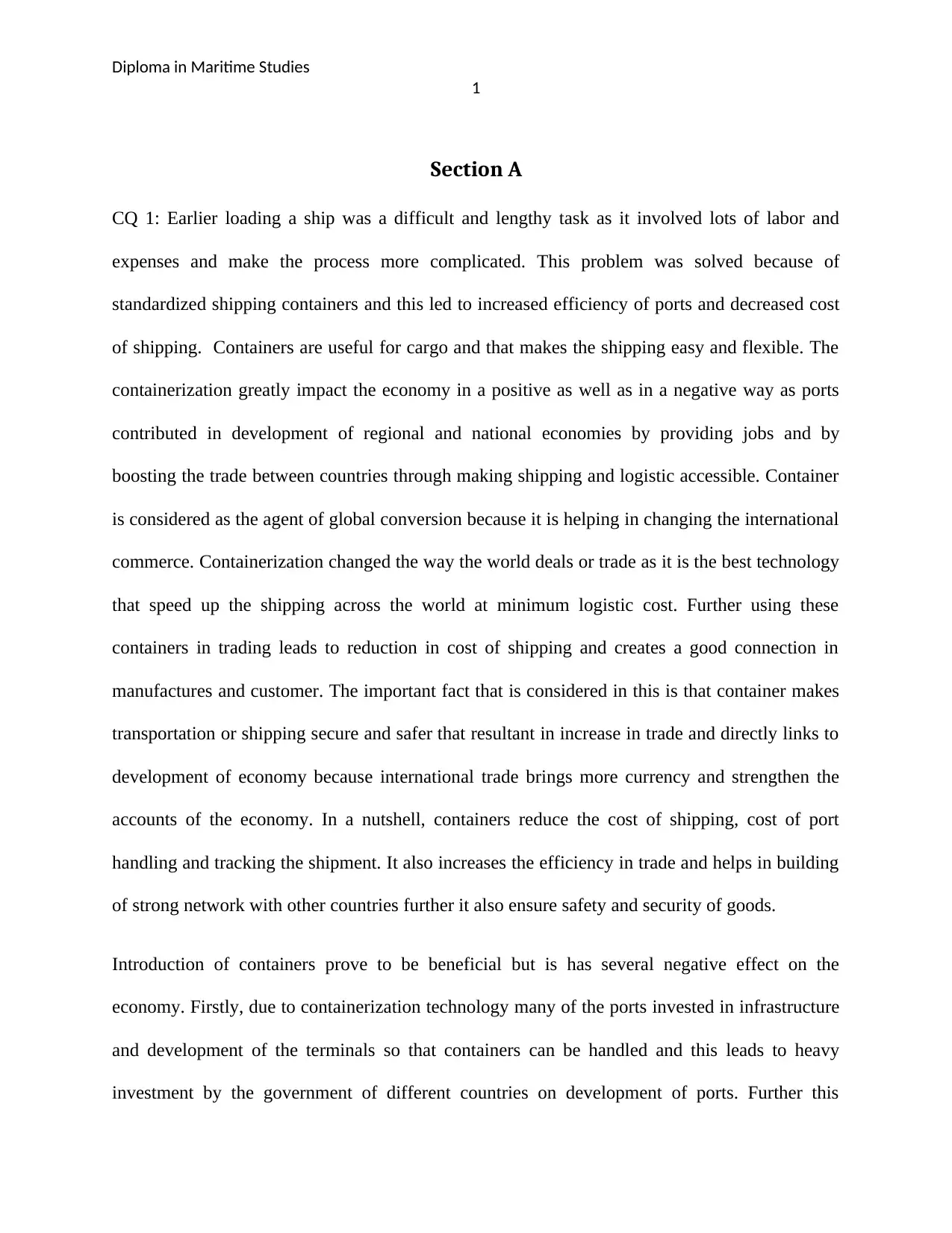
Diploma in Maritime Studies
1
Section A
CQ 1: Earlier loading a ship was a difficult and lengthy task as it involved lots of labor and
expenses and make the process more complicated. This problem was solved because of
standardized shipping containers and this led to increased efficiency of ports and decreased cost
of shipping. Containers are useful for cargo and that makes the shipping easy and flexible. The
containerization greatly impact the economy in a positive as well as in a negative way as ports
contributed in development of regional and national economies by providing jobs and by
boosting the trade between countries through making shipping and logistic accessible. Container
is considered as the agent of global conversion because it is helping in changing the international
commerce. Containerization changed the way the world deals or trade as it is the best technology
that speed up the shipping across the world at minimum logistic cost. Further using these
containers in trading leads to reduction in cost of shipping and creates a good connection in
manufactures and customer. The important fact that is considered in this is that container makes
transportation or shipping secure and safer that resultant in increase in trade and directly links to
development of economy because international trade brings more currency and strengthen the
accounts of the economy. In a nutshell, containers reduce the cost of shipping, cost of port
handling and tracking the shipment. It also increases the efficiency in trade and helps in building
of strong network with other countries further it also ensure safety and security of goods.
Introduction of containers prove to be beneficial but is has several negative effect on the
economy. Firstly, due to containerization technology many of the ports invested in infrastructure
and development of the terminals so that containers can be handled and this leads to heavy
investment by the government of different countries on development of ports. Further this
1
Section A
CQ 1: Earlier loading a ship was a difficult and lengthy task as it involved lots of labor and
expenses and make the process more complicated. This problem was solved because of
standardized shipping containers and this led to increased efficiency of ports and decreased cost
of shipping. Containers are useful for cargo and that makes the shipping easy and flexible. The
containerization greatly impact the economy in a positive as well as in a negative way as ports
contributed in development of regional and national economies by providing jobs and by
boosting the trade between countries through making shipping and logistic accessible. Container
is considered as the agent of global conversion because it is helping in changing the international
commerce. Containerization changed the way the world deals or trade as it is the best technology
that speed up the shipping across the world at minimum logistic cost. Further using these
containers in trading leads to reduction in cost of shipping and creates a good connection in
manufactures and customer. The important fact that is considered in this is that container makes
transportation or shipping secure and safer that resultant in increase in trade and directly links to
development of economy because international trade brings more currency and strengthen the
accounts of the economy. In a nutshell, containers reduce the cost of shipping, cost of port
handling and tracking the shipment. It also increases the efficiency in trade and helps in building
of strong network with other countries further it also ensure safety and security of goods.
Introduction of containers prove to be beneficial but is has several negative effect on the
economy. Firstly, due to containerization technology many of the ports invested in infrastructure
and development of the terminals so that containers can be handled and this leads to heavy
investment by the government of different countries on development of ports. Further this
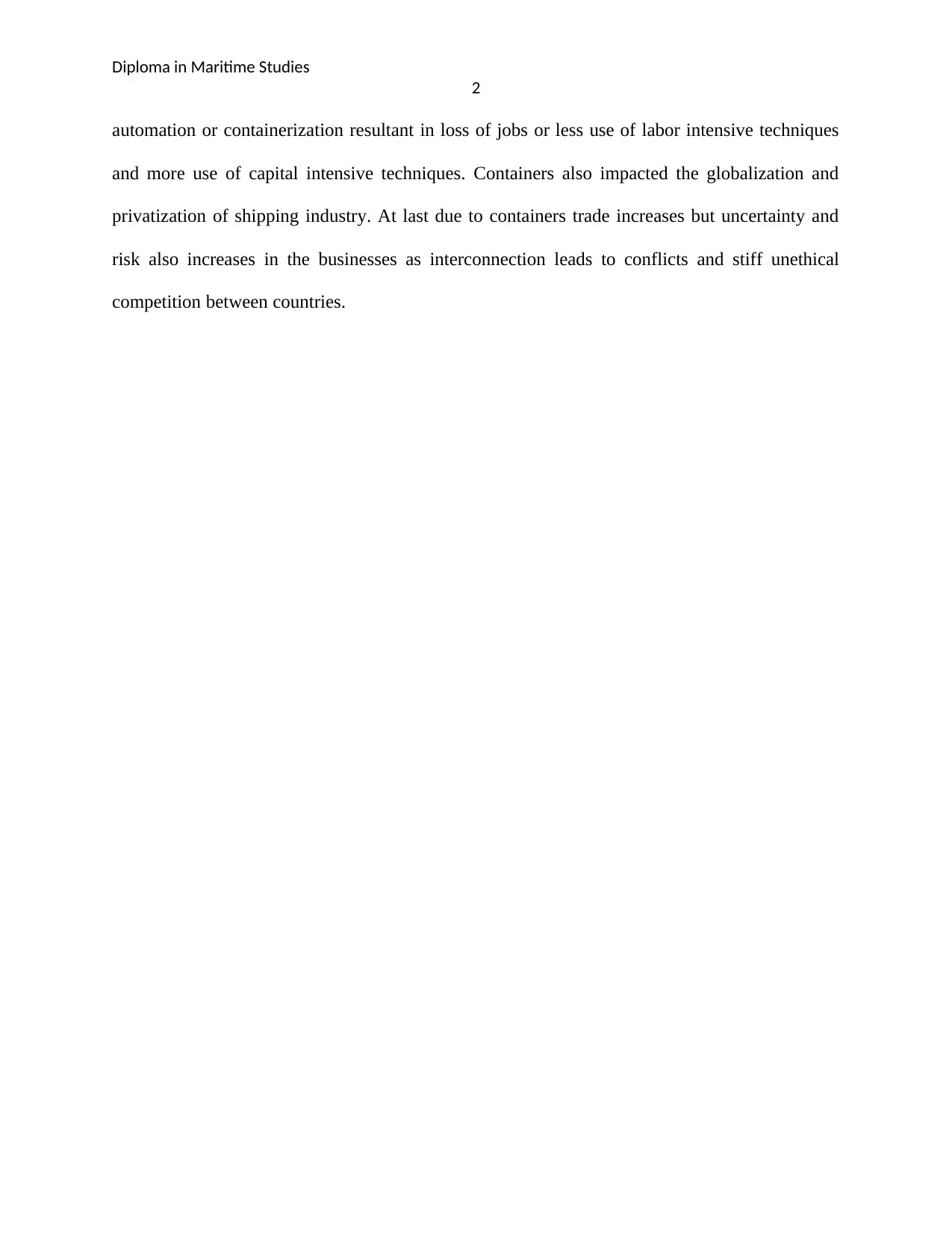
Diploma in Maritime Studies
2
automation or containerization resultant in loss of jobs or less use of labor intensive techniques
and more use of capital intensive techniques. Containers also impacted the globalization and
privatization of shipping industry. At last due to containers trade increases but uncertainty and
risk also increases in the businesses as interconnection leads to conflicts and stiff unethical
competition between countries.
2
automation or containerization resultant in loss of jobs or less use of labor intensive techniques
and more use of capital intensive techniques. Containers also impacted the globalization and
privatization of shipping industry. At last due to containers trade increases but uncertainty and
risk also increases in the businesses as interconnection leads to conflicts and stiff unethical
competition between countries.
⊘ This is a preview!⊘
Do you want full access?
Subscribe today to unlock all pages.

Trusted by 1+ million students worldwide
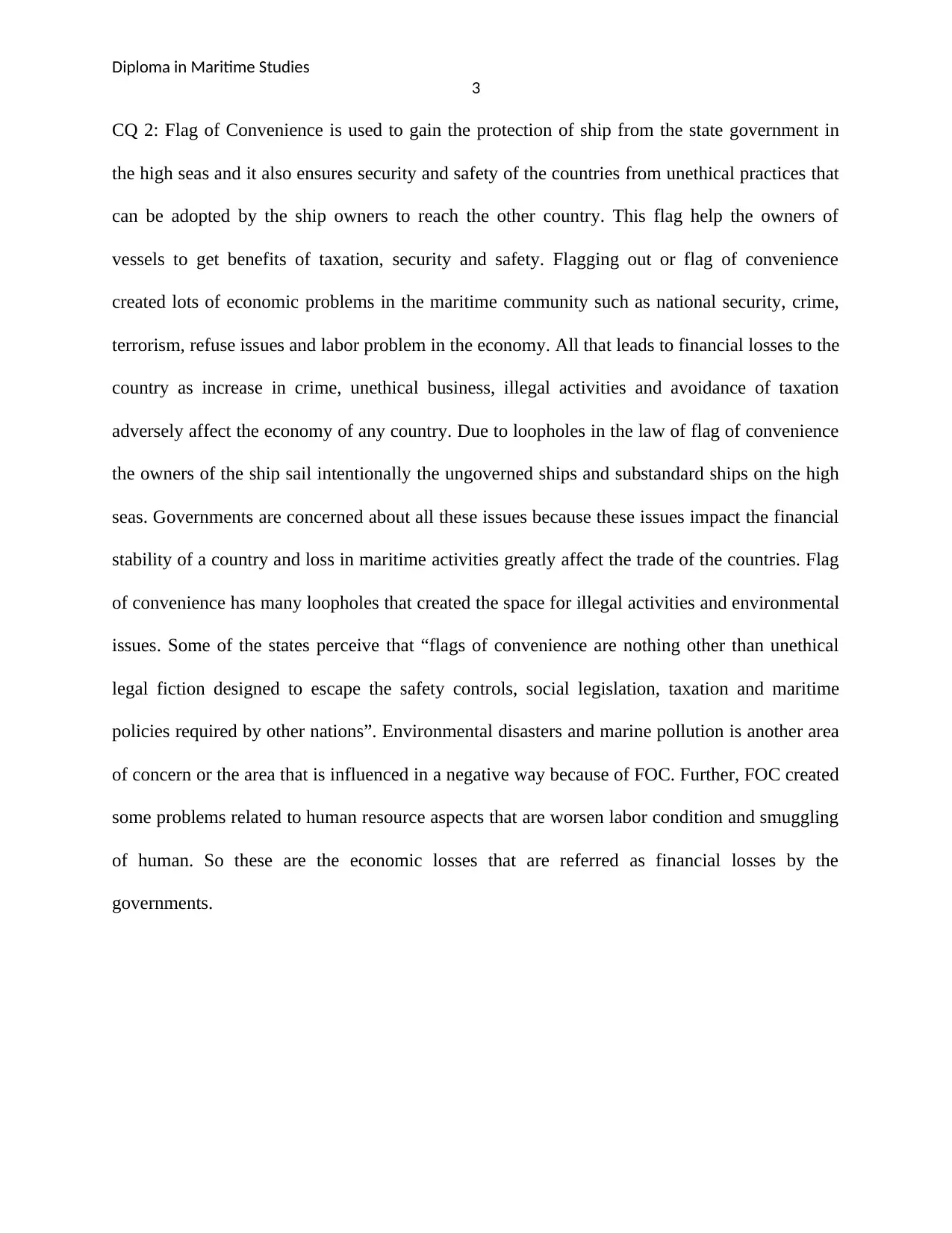
Diploma in Maritime Studies
3
CQ 2: Flag of Convenience is used to gain the protection of ship from the state government in
the high seas and it also ensures security and safety of the countries from unethical practices that
can be adopted by the ship owners to reach the other country. This flag help the owners of
vessels to get benefits of taxation, security and safety. Flagging out or flag of convenience
created lots of economic problems in the maritime community such as national security, crime,
terrorism, refuse issues and labor problem in the economy. All that leads to financial losses to the
country as increase in crime, unethical business, illegal activities and avoidance of taxation
adversely affect the economy of any country. Due to loopholes in the law of flag of convenience
the owners of the ship sail intentionally the ungoverned ships and substandard ships on the high
seas. Governments are concerned about all these issues because these issues impact the financial
stability of a country and loss in maritime activities greatly affect the trade of the countries. Flag
of convenience has many loopholes that created the space for illegal activities and environmental
issues. Some of the states perceive that “flags of convenience are nothing other than unethical
legal fiction designed to escape the safety controls, social legislation, taxation and maritime
policies required by other nations”. Environmental disasters and marine pollution is another area
of concern or the area that is influenced in a negative way because of FOC. Further, FOC created
some problems related to human resource aspects that are worsen labor condition and smuggling
of human. So these are the economic losses that are referred as financial losses by the
governments.
3
CQ 2: Flag of Convenience is used to gain the protection of ship from the state government in
the high seas and it also ensures security and safety of the countries from unethical practices that
can be adopted by the ship owners to reach the other country. This flag help the owners of
vessels to get benefits of taxation, security and safety. Flagging out or flag of convenience
created lots of economic problems in the maritime community such as national security, crime,
terrorism, refuse issues and labor problem in the economy. All that leads to financial losses to the
country as increase in crime, unethical business, illegal activities and avoidance of taxation
adversely affect the economy of any country. Due to loopholes in the law of flag of convenience
the owners of the ship sail intentionally the ungoverned ships and substandard ships on the high
seas. Governments are concerned about all these issues because these issues impact the financial
stability of a country and loss in maritime activities greatly affect the trade of the countries. Flag
of convenience has many loopholes that created the space for illegal activities and environmental
issues. Some of the states perceive that “flags of convenience are nothing other than unethical
legal fiction designed to escape the safety controls, social legislation, taxation and maritime
policies required by other nations”. Environmental disasters and marine pollution is another area
of concern or the area that is influenced in a negative way because of FOC. Further, FOC created
some problems related to human resource aspects that are worsen labor condition and smuggling
of human. So these are the economic losses that are referred as financial losses by the
governments.
Paraphrase This Document
Need a fresh take? Get an instant paraphrase of this document with our AI Paraphraser
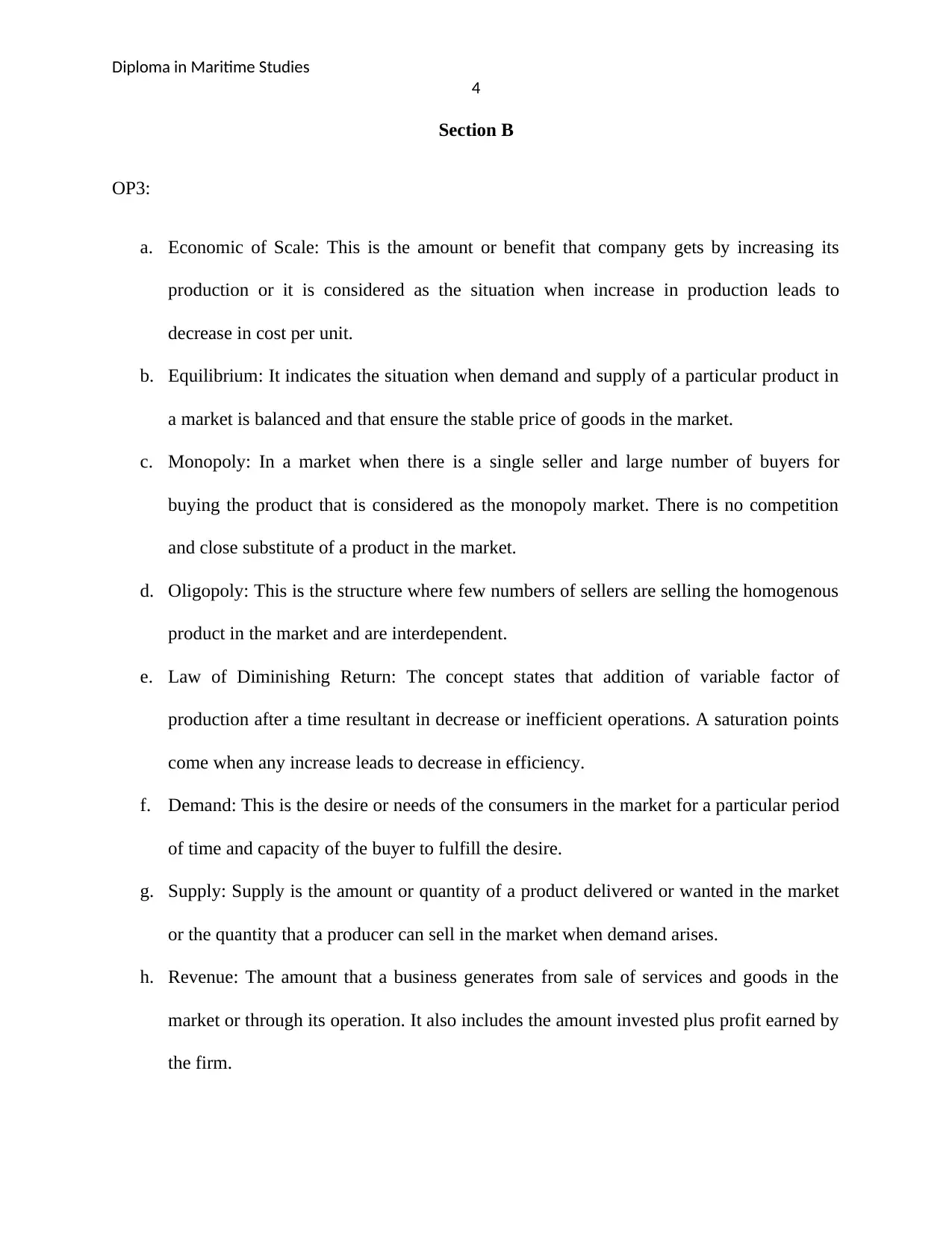
Diploma in Maritime Studies
4
Section B
OP3:
a. Economic of Scale: This is the amount or benefit that company gets by increasing its
production or it is considered as the situation when increase in production leads to
decrease in cost per unit.
b. Equilibrium: It indicates the situation when demand and supply of a particular product in
a market is balanced and that ensure the stable price of goods in the market.
c. Monopoly: In a market when there is a single seller and large number of buyers for
buying the product that is considered as the monopoly market. There is no competition
and close substitute of a product in the market.
d. Oligopoly: This is the structure where few numbers of sellers are selling the homogenous
product in the market and are interdependent.
e. Law of Diminishing Return: The concept states that addition of variable factor of
production after a time resultant in decrease or inefficient operations. A saturation points
come when any increase leads to decrease in efficiency.
f. Demand: This is the desire or needs of the consumers in the market for a particular period
of time and capacity of the buyer to fulfill the desire.
g. Supply: Supply is the amount or quantity of a product delivered or wanted in the market
or the quantity that a producer can sell in the market when demand arises.
h. Revenue: The amount that a business generates from sale of services and goods in the
market or through its operation. It also includes the amount invested plus profit earned by
the firm.
4
Section B
OP3:
a. Economic of Scale: This is the amount or benefit that company gets by increasing its
production or it is considered as the situation when increase in production leads to
decrease in cost per unit.
b. Equilibrium: It indicates the situation when demand and supply of a particular product in
a market is balanced and that ensure the stable price of goods in the market.
c. Monopoly: In a market when there is a single seller and large number of buyers for
buying the product that is considered as the monopoly market. There is no competition
and close substitute of a product in the market.
d. Oligopoly: This is the structure where few numbers of sellers are selling the homogenous
product in the market and are interdependent.
e. Law of Diminishing Return: The concept states that addition of variable factor of
production after a time resultant in decrease or inefficient operations. A saturation points
come when any increase leads to decrease in efficiency.
f. Demand: This is the desire or needs of the consumers in the market for a particular period
of time and capacity of the buyer to fulfill the desire.
g. Supply: Supply is the amount or quantity of a product delivered or wanted in the market
or the quantity that a producer can sell in the market when demand arises.
h. Revenue: The amount that a business generates from sale of services and goods in the
market or through its operation. It also includes the amount invested plus profit earned by
the firm.
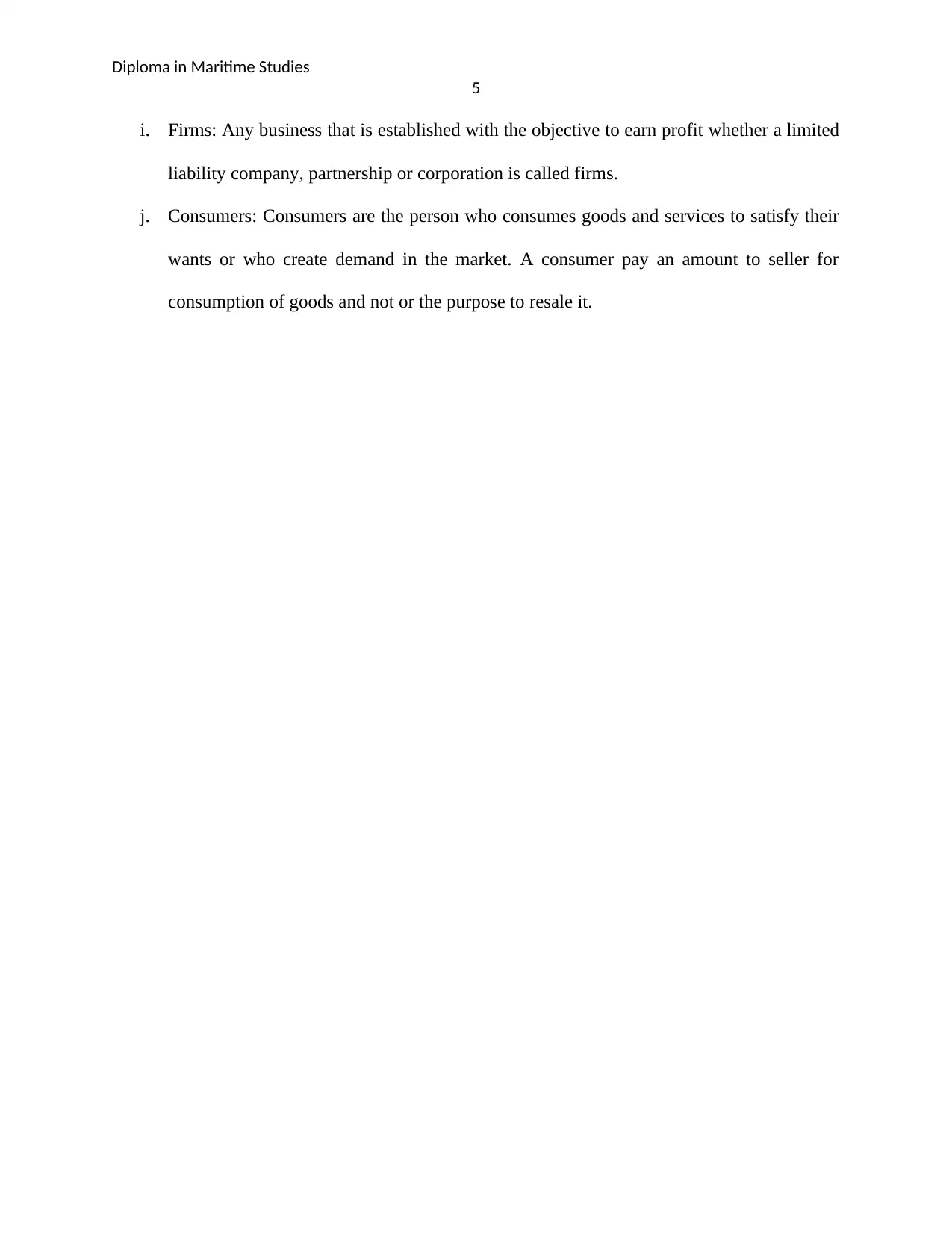
Diploma in Maritime Studies
5
i. Firms: Any business that is established with the objective to earn profit whether a limited
liability company, partnership or corporation is called firms.
j. Consumers: Consumers are the person who consumes goods and services to satisfy their
wants or who create demand in the market. A consumer pay an amount to seller for
consumption of goods and not or the purpose to resale it.
5
i. Firms: Any business that is established with the objective to earn profit whether a limited
liability company, partnership or corporation is called firms.
j. Consumers: Consumers are the person who consumes goods and services to satisfy their
wants or who create demand in the market. A consumer pay an amount to seller for
consumption of goods and not or the purpose to resale it.
⊘ This is a preview!⊘
Do you want full access?
Subscribe today to unlock all pages.

Trusted by 1+ million students worldwide
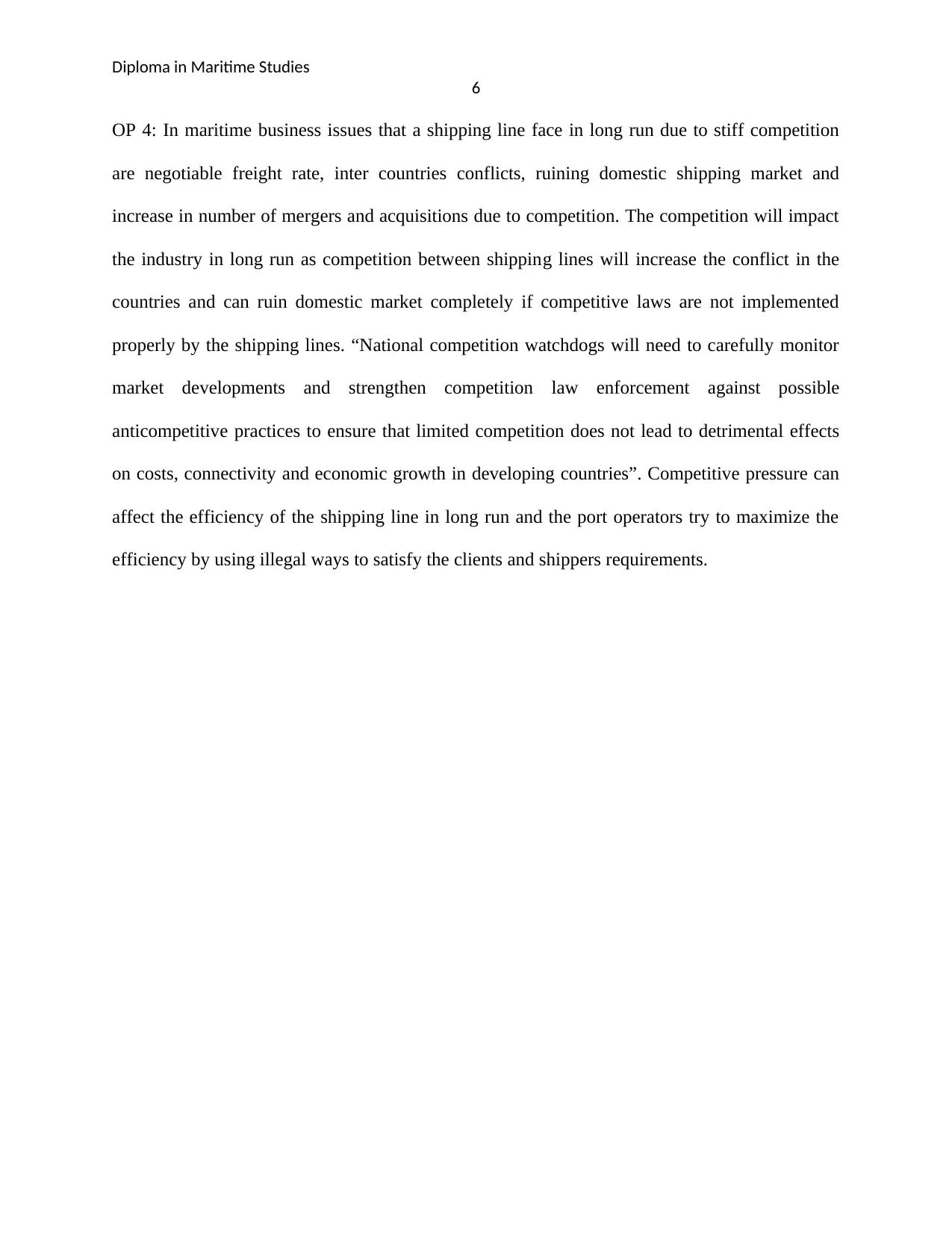
Diploma in Maritime Studies
6
OP 4: In maritime business issues that a shipping line face in long run due to stiff competition
are negotiable freight rate, inter countries conflicts, ruining domestic shipping market and
increase in number of mergers and acquisitions due to competition. The competition will impact
the industry in long run as competition between shipping lines will increase the conflict in the
countries and can ruin domestic market completely if competitive laws are not implemented
properly by the shipping lines. “National competition watchdogs will need to carefully monitor
market developments and strengthen competition law enforcement against possible
anticompetitive practices to ensure that limited competition does not lead to detrimental effects
on costs, connectivity and economic growth in developing countries”. Competitive pressure can
affect the efficiency of the shipping line in long run and the port operators try to maximize the
efficiency by using illegal ways to satisfy the clients and shippers requirements.
6
OP 4: In maritime business issues that a shipping line face in long run due to stiff competition
are negotiable freight rate, inter countries conflicts, ruining domestic shipping market and
increase in number of mergers and acquisitions due to competition. The competition will impact
the industry in long run as competition between shipping lines will increase the conflict in the
countries and can ruin domestic market completely if competitive laws are not implemented
properly by the shipping lines. “National competition watchdogs will need to carefully monitor
market developments and strengthen competition law enforcement against possible
anticompetitive practices to ensure that limited competition does not lead to detrimental effects
on costs, connectivity and economic growth in developing countries”. Competitive pressure can
affect the efficiency of the shipping line in long run and the port operators try to maximize the
efficiency by using illegal ways to satisfy the clients and shippers requirements.
1 out of 7
Your All-in-One AI-Powered Toolkit for Academic Success.
+13062052269
info@desklib.com
Available 24*7 on WhatsApp / Email
![[object Object]](/_next/static/media/star-bottom.7253800d.svg)
Unlock your academic potential
Copyright © 2020–2026 A2Z Services. All Rights Reserved. Developed and managed by ZUCOL.


